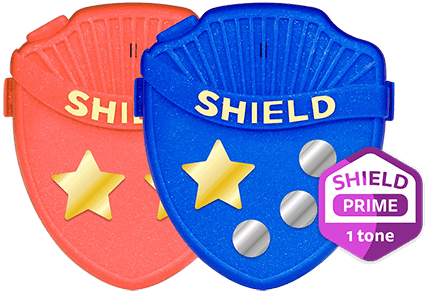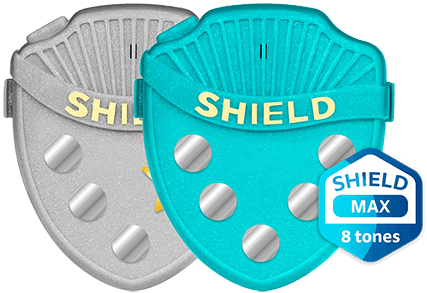How to Stop Wetting The Bed
When wetting the bed becomes a problem in your home, it can be very frustrating and embarrassing, but it’s actually very common problem with approximately 5 to 7 million children in U.S alone whose parents are looking for ways on hot to stop wetting the bed every night. Often times when a child is wetting the bed, the reason is due either to an undiagnosed medical condition or due to psychological effects. As a parent, you will want to find out what is happening with your child and ways on how to stop wetting the bed. Many teens have bedwetting issue and adults face lot of problem when they have to deal with this unwanted situation.
Shield alarms are the best bedwetting alarms to stop wetting the bed:

SHIELD PRIME BEDWETTING ALARM
Shield Prime bedwetting alarm is a compact and discreet alarm with powerful built in technology to make you stop wetting the bed quickly. The single tone alarm comes in two metallic colors – Royal Blue and Red. Each is engineered to stop bedwetting in children ages 5 and up and teenagers who wet the bed at night.

SHIELD MAX BEDWETTING ALARM
Shield Max bedwetting alarm is a highly recommended to help you stop wetting the bed. It comes in two metallic colors – Teal and Silver and is powered by 8 loud alert tones, a bright light and strong vibrations. Shield alarms offer ideal treatment for bedwetting children ages 5 plus and teens.
How to Stop Wetting The Bed In Children?
Bedwetting occurs at night, and often in children who have no trouble or little trouble controlling their bladder during the day. This means that for these children, wetting the bed makes bedtime a terrible time. There are several reasons why a child wets the bed. It could be genetic as about three out of four children who wet the bed have a first degree relative that had a same problem. It’s also caused by a lack of communication between the bladder and brain or when a child has a small bladder and does not have enough room to hold urine.
The medical term for bed wetting is Enuresis and it is a serious subject for medical research. Among medical causes, ailments such as urinary tract infections, allergies, diabetes, cell anemia and sleep disorders are often the culprits.
- Your child has suddenly developed a problem after having no problems staying dry before.
- Your child avoids normal activities that they like (camping, going out) because of bedwetting.
- Child is bedwetting regularly after eight years old and the problem is causing distress.
- Bedwetting is causing problems in the household.
Tips on How to Stop Wetting The Bed In Children
- Educate Yourself–Educate yourself about the facts of bedwetting. However, you will want to share what you have learned with others in your household.
- Educate your child–For the child affected by Enuresis, being told the facts about bedwetting can be a big help. That way, your child can focus on resolving the problem rather than worry about the embarrassment they feel.
- Don’t let it become a big deal–Don’t make how to stop wetting the bed – an un-dangerous condition – become a big issue at your house.
- Make it less stressful—Once you have evaluated the bed wetting in your household, you can develop a plan of action.
- Don’t punish your child—Children don’t wet their bed on purpose so be polite with them and make them know that it is not their fault.
- Talk about bedwetting with your child—Children who wet the bed has low self- esteem and they feel bad about it. Share with them if someone in the family had the same problem.
- Mark the calendar—Keep the track of both dry and wet nights that can motivate your child end his or her bedwetting.
- More liquids during day time—Encourage your child to drink more fluids during the day and urinate as soon as there is an urge to go.
- Limiting liquids just before bed time—Limiting the liquids before bedtime will delay filling the bladder which would give some extra time to your child to wake up before they actually wet the bed.
- Cut the caffeine—Avoid sodas and sport energy drinks at night because caffeine can trigger bedwetting.
- Pay attention to constipation—-Constipation can put pressure on bladder, making it difficult to hold urine and an urge to go.
- Use bathroom before bedtime—-Let your child make a habit to use the bathroom and empties the bladder before the bedtime, this could lower the chance of a bedwetting accident.
- See the pediatrician—If your child suddenly starts wetting talk to your pediatrician if they have urinary tract infection or any other rare condition like diabetes or a neurological problem.
- Use bedwetting alarms—-Bedwetting alarm is often the best solution to stop bedwetting permanently in children. You can clip the alarm to the child’s underwear. Once the device detects any moisture, the alarm goes off. The regular use of alarm helps a child get up on his own even before the bedwetting occurs.
- Medications—Although there are medications but consult your doctor before giving as they can have side effects.
Tips on How to Stop Wetting The Bed In Teens (Teenage Bedwetting)
If a teenager is wetting the bed ,there are some strategies worth considering that can help stop wetting the bed in teens (teenage bedwetting)
- Keep things low-key–Make sure that the approach to bedwetting is a low-key one. make sure that any treatments or remedies used are offered in a low-key, nonthreatening way
- Do bladder exercise—The bladder can be strengthened and taught to do better control itself with exercise that helps hold the urine for long time.
- Avoid caffeine products—Caffeine simulates the bladder to produce more urine so cut it out in the evenings.
- Avoid constipation—-Constipation could be the bedwetting culprit. Have clear bowel to avoid bedwetting.
- Bedwetting medications—Consult your doctor before taking any bedwetting medications as they have side effects.
- Use bathroom before bedtime—Form a habit of empty your bladder before bed time, this could lead to lower chance of nighttime wetting.
- Don’t blame yourself—-Bedwetting is not your fault, Be confident to overcome the situation.
- Avoid liquids before bedtime—–Drink more liquids during the day and limit the liquid intake just prior to going to bed.
- Talk to your family— Share your bedwetting problem with your family they can help you to overcome your stress that is a major bedwetting issue.
- Use bedwetting alarm—Some of the bedwetting alarms are designed for teens. They help a bed wetter get up as soon as the sensor detects the urine and alarm starts making alert sounds and vibration. Using alarm for few weeks continuously develops the connection between brain and bladder and help bed wetter get up sooner and sooner before they wet the bed.
- Use waterproof bedding—Plastic sheets protect the mattress from bedwetting accidents but are not comfortable to sleep on. Use waterproof bedding to save your bed from unwanted stains .
- Consult your doctor—Consult your doctor to check if you have any medical issues
- Check if bedwetting is hereditary—If any of your immediate family member had bedwetting let them share their stories with you
- Urination control exercise—-helping a teen control urination helps control the urinary sphincter, or the muscle that holds back or releases urine. This exercise is often used in conjunction with the bladder control exercise and is completely safe.
